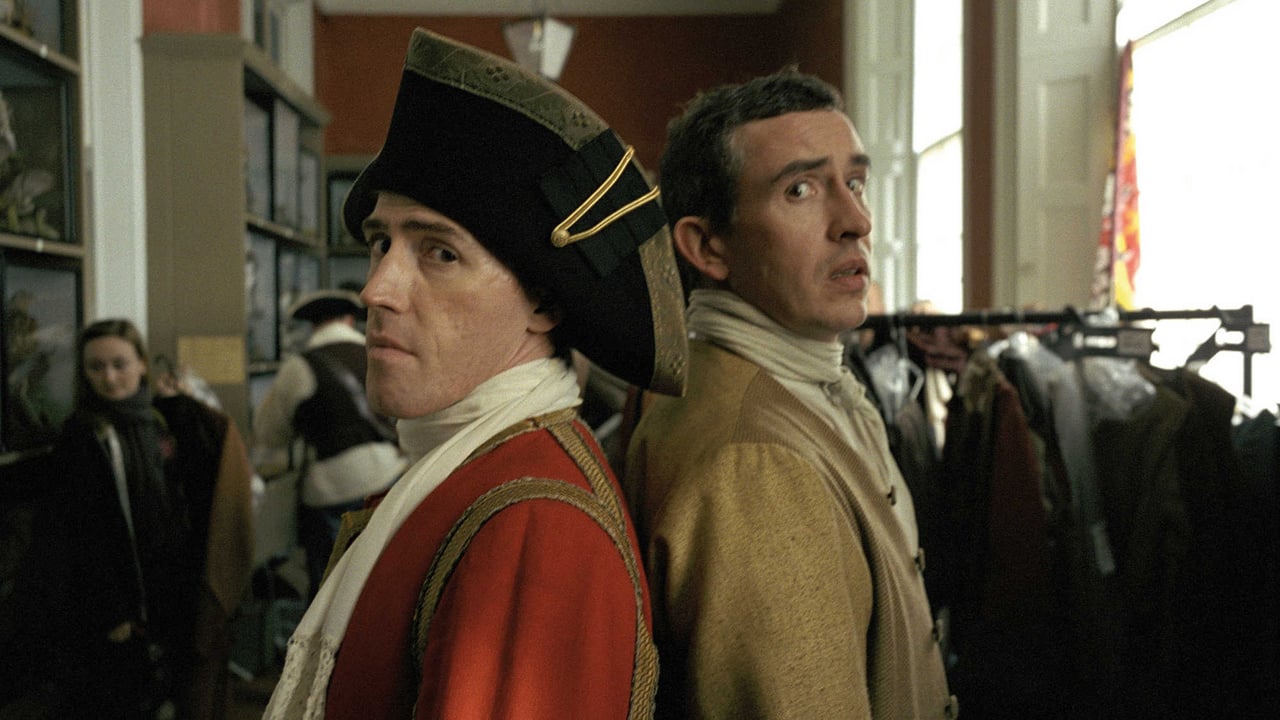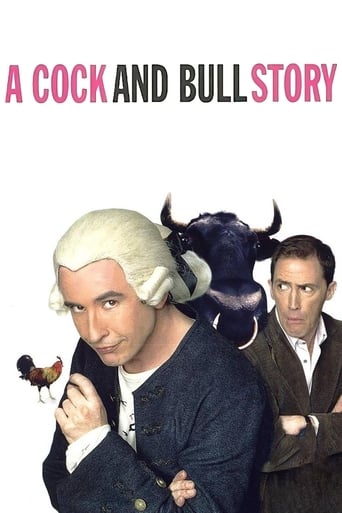



Lack of good storyline.
Good films always raise compelling questions, whether the format is fiction or documentary fact.
View MoreThis is one of the few movies I've ever seen where the whole audience broke into spontaneous, loud applause a third of the way in.
View MoreA movie that not only functions as a solid scarefest but a razor-sharp satire.
View MoreAlthough I admire the intention of this movie, its execution is ruined for me by its very annoying stars and a director who indulges their excesses.Evidently there are people in addition to Steve Coogan and Rob Brydon who think they're adorable, but I don't. Their pretentious banter drives me up the wall, and even when apart each man is irritating, not cute. I forced myself to get past the extremely stupid opening scene, when they dig at each other while being made up for their roles in the Shandy movie, but their personalities dominate this movie to such an extent that I had to quit watching after a while.I made the mistake a year or two ago of renting a movie in which the same two actors play themselves traveling around contemporary England together for some reason that I don't remember and don't want to remember. I don't even want to remember that movie's title. Unfortunately for me, I also didn't remember their names, so I didn't realize until I got the DVD that this movie stars the same two very annoying actors. I'll remember their names this time and avoid any other movies they're in.
View MoreSteve Coogan, having wowed all with the send-up of Reactionary England that is Alan Partridge, ponders what he will do next.Stephen Fry, channelling the hurt of the Native Americans dug up in the excellent TV show QI, communicates with Partridge via telekinesis. He suggests they show off by making a literary adaptation.This is a joke.Partridge protests at the last paragraph, insisting that "A Cock and Bull Story" is considerably more amusing than it. I smush him. Nonetheless, the film became legion, making lots of people watch.Somewhere, a young man vomits.
View MoreA movie about the making of a movie and the movie in question is "Tristram Shandy", the novel they said was unfilmable and which isn't filmed here. It begins like a deconstruction of the novel in filmic terms, part Tony Richardson's "Tom Jones" and part Karel Reisz's version of "The French Lieutenant's Woman" but it soon abandons that approach in favour of a reasonably straightforward account of the film-making process in which the two stars of the film within the film, Steven Coogan and Rob Brydon, play themselves or rather are acting 'characters' called Steve Coogan and Rob Brydon since this is fiction and not a documentary. It is never as funny or as 'post-modern' as it thinks it is and somehow it is the 'Tristram Shandy' sequences which come off best. Still, it is as idiosyncratic as anything Michael Winterbottom has done, self-indulgent and bold at the same time. It will do until someone actually films "Tristram Shandy".
View MoreThe publicity and acclaim for this film circles round the notion that director Michael Winterbottom is filming an 'unfilmable' novel (Sterne's 'Tristram Shandy'), making a witty post-modern exercise in cleverness with in-jokes, references to other films and echoes of other films about the making of films (Fellini's 8 1/2), inane comic banter, etc. But, for me, that that smacks of defensiveness and self-justification, a worry that the way this book has been approached is something that might have sounded good in practise, but doesn't work well in theory because it is too flimsy a way of working, too narrow a view of what the book is about to construct an entire film around. I'll expand: in fact, the first 20 minutes or so make a decent stab of filming the book, switching backwards and forwards in time (breaking the linear narrative structure that most films tend to use in a far more complicated way than the flashbacks you sometimes get), having Steve Coogan (as Tristram) give direct to camera addresses as he narrates the story of his character's life, and with different actors playing the same characters (Coogan, as Tristram, announces that he is also going to play his father, as there is a 'family resemblance' - a nice touch whereby he acknowledges that he is acting but remains 'in character') - certainly not that conventional, but not as irrelevant as the rest of the film, which comes across a bit like an episode of Ricky Gervais' TV series 'Extras' without the sharp social observation and cringe-worthy brilliance. The problems start when, without warning, in a pregnancy scene, we suddenly hear 'Cut' and see the film crew, whereupon we are rushed backstage as Coogan, now playing himself, goes to various meetings, doesn't have sex with his girlfriend, deals with a journalist who knows that he DID have sex with a pole-dancer (this a particularly puzzling incident, treated in a surprisingly casual way), cracks jokes with co-star Rob Brydon, complains about his costume, and so on, ad infinitum. We see Coogan and and Brydon sitting in a viewing theatre, along with various other people involved with the film's making, commenting on the rushes of the film they're making ("that battle looks like it's been filmed with about 10 men") - of course, this is a scene which is actually in the film we're watching - oh how clever and postmodern... - such touches abound. It's all very obvious, and must have sounded good in theory - "we'll echo the dislocation of the book by making a dislocated film", but it really doesn't work in practise. In one scene, Coogan is being interviewed about the film he is making:Tony Wilson: Why "Tristram Shandy"? This is the book that many people said is unfilmable. Steve Coogan: I think that's the attraction. "Tristram Shandy" was a post-modern classic written before there was any modernism to be post about. So it was way ahead of its time and, in fact, for those who haven't heard of it, it was actually listed as number eight on the Observer's top 100 books of all time. Tony Wilson: That was a *chronological* list. The problem with this is that we're not sure how seriously to take it. Is the joke, poking fun at Coogan's lack of knowledge of the project he's at work on, merely there for a laugh? Is Winterbottom making his points through interviewer Wilson's mouth (in which case, wow. Yes we know it's ahead-of-its-time, but is there any intrinsic value in that?) Is it a comment on the way we try to categorise and pigeonhole 'greatness'? Such ambiguity characterises much of the film - nothing wrong with ambiguity, but it helps if it has a discernible purpose (even if that purpose has to be dug out carefully, with an intellectual scalpel). To me, what we have is ultimately the sight and sound (oh! film-related reference! did you notice?) of a smug and self-satisfied director making yet another in-joke to be trendy and post-modern about being trendy and post-modern...This impressions is exacerbated by the glimpses we get of what they're filming (a battle scene, Stephen Fry as Parson Yorrick, Coogan as Tristram suspended in a giant womb), which suggest that it would have been a much more satisfying viewing experience to make 'the film of the book' rather than the faked behind-the-scenes/acted film masquerading as documentary of the making of the film of the book...So, to sum up. The plot summary here on IMDb says this: "interruptions are constant. Scenes are shot, re-shot, and discarded. The purpose of the project is elusive. Fathers and sons; men and women; cocks and bulls. Life is amorphous, too full and too rich to be captured in one narrative." This last sentence is roughly what Stephen Fry says when he suddenly pops up to explain what the novel is 'about'. It's a bizarre moment - almost as if Winterbottom is worried the audience won't 'get' what he's doing, so he's trying to smooth their brows and reassure them that there's a point to all this. But I'm not convinced it needed to be done this way - for me, all the behind-the-scenes ramblings doesn't really get us anywhere. The book was packed with incident and character - this has a fair amount of incident, but few very interesting characters (especially as we know that Coogan and Brydon are playing fairly unsympathetic versions of themselves and are thus 'not really like that'), and if all it's there for is to say, if it can condense the whole book into just the one idea - that life is too full to be captured in one narrative - then I'm not convinced it's worth doing.
View More